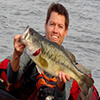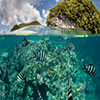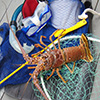Florida Fishing Courses
Thanks to the Internet, myriad sources of guided fishing are a click away. Structured classes and seminars are gaining popularity, covering everything from tackle rigging to casting to fly tying. Many bait and tackle shops, major outdoor sport retail stores, fishing clubs and local police athletic leagues either operate free or affordable fishing programs and workshops for kids, adults, and as of late, for women wishing to learn the sport. Many fishing tackle and boat companies sponsor such programs. All U.S. state-level Departments of Fish and Wildlife either directly host or make possible free fishing clinics, sometimes in collaboration with nonprofit organizations. For the best state park fishing education options, continue below.
Fishing Safety
Because fishing is all about water, an angler's first consideration should be personal safety, and the safety of others. Both fish and the very act of fishing can cause bodily injury, particularly on party boats with many anglers, or while fishing on public piers. Eye injuries, hook impalement and fish bites are most common, and the leading causes of death while fishing include drowning, lightning strike heat stroke and severe hypothermia. All of which can be prevented.
Tips for a Safe Fishing Trip:- Boating anglers must carry a USCG-approved life jacket for each passenger aboard, and should always wear it while underway, or fishing if possible.
- Weather is among the dangers of fishing in Florida. Check short-range forecasts for the day you fish, and take cover on land if lightning threatens. Boating anglers must pay heed to marine forecasts, winds and accompanying sea heights.
- When fishing from shore, be sure that there is stable footing, such on jetties, beaches and manmade structures, especially where current is swift.
- Along with required boat equipment, carry extra water, fully charged cell phone and any medications you need.
- Whether fishing from the shore or from a boat, wear proper shoes that protect from slipping, or sharp objects.
- Stay hydrated at all times, and wear clothing in layers to ward off hypothermia or heat stroke.
- Wear gloves that protect from sharp fish fins and teeth, and use a hook disgorger or pliers to remove hooks from your catch. Whenever possible, pinch down hook barbs for easier removal, should you become impaled by a hook.
- Always wear goggles or sunglasses! Eye injuries are common when casting or fishing near others, especially at night.
- Carry and use insect repellent, and if you aren’t sensitive to bug stings, carry topical or oral medication to prevent allergic reactions.
- Always leave a “float plan” with a relative, friend, or marina operator. If fishing a long distance from your car while on foot, consider doing the same.
Florida Fishing Regulations
Before you fuel up your boat and gather supplies for your fishing vacation, it’s important to brush up on Florida’s fishing regulations. Make sure everyone in your vessel is aware of the rules pertaining to bait, hooks and gear, venting tools and species before casting a rod into Florida’s Atlantic Ocean or Gulf Coast waters. And the best way to do so is to check out our “How to Become a Licensed Fisherman eBook.”




